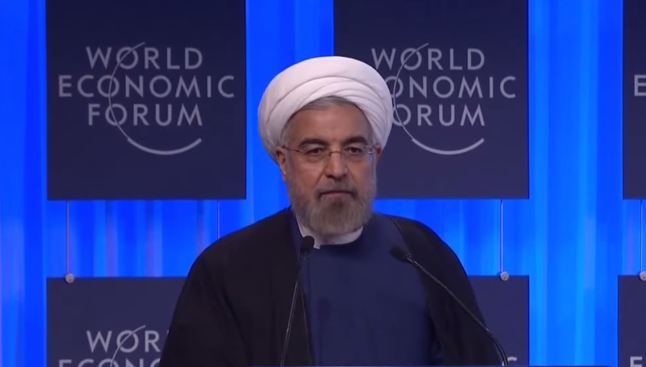Breaking
Iran’s president lashes out at nuke deal critics

Pres. Hassan Rouhani of Iran at the World Economic Forum 2014. Screenshot of PressTV footage.
TEHRAN, Iran — Iranian President Hassan Rouhani offered his harshest criticism yet Monday of hard-liners opposed to making a deal over its contested nuclear program with world powers, saying they should go “to hell.”
Iran reached a preliminary deal last November that curbed parts of its atomic program in exchange for some economic sanctions to be eased, an agreement hard-liners said gave too much away. Now, as negotiators face a Nov. 24 deadline to reach a final deal, hard-liners have been increasing their pressure on Rouhani and those trying to reach a compromise with the West.
Speaking Monday to an annual meeting of Iranian ambassadors, Rouhani called his hard-line critics “political cowards.”
“Anytime there is going to be negotiations, a handful say we are shaking. Well, to hell. Go and find a warm place for yourself. What should we do?” an angry Rouhani said in comments broadcast live on state television.
Rouhani said his government will continue his policy of moderation and “constructive engagement” with the West.
Supreme Leader Ayatollah Ali Khamenei, who has the final say on all state matters, has backed the nuclear negotiating team. Yet that hasn’t stopped hard-liners from calling the interim nuclear deal a “poison chalice” for Iran. They also organized a high-profile meeting last month to criticize Rouhani and the negotiators, saying the government has no right to accept limitations on Iran’s uranium enrichment.
The West fears Iran’s nuclear program could allow the country to build atomic weapons. Iran says its program is for peaceful means, like power generation and medical research.
Under the interim deal reached last November, Iran agreed to convert or dilute its stockpile of 20-percent enriched uranium. Uranium at 20 percent is only a technical step away from weapons-grade material and Iran once had more than 200 kilograms (440 pounds) in its stockpile — nearly enough for a weapon.
The main dispute now facing negotiators is over uranium enrichment. Tehran wants to be allowed to expand its enrichment program over the next eight years to a level that would need about 190,000 current-model enriching centrifuges.
Iran now has about 20,000 centrifuges, with half of them operating. U.S. negotiators say even 10,000 are too many.
Rouhani repeated Monday that his government seeks a “win-win” solution where both Iran and the West will feel victorious. However, hard-liners say they won’t allow that to happen, setting up a possible political challenge to Rouhani’s administration in the weeks ahead as negotiations continue.





















